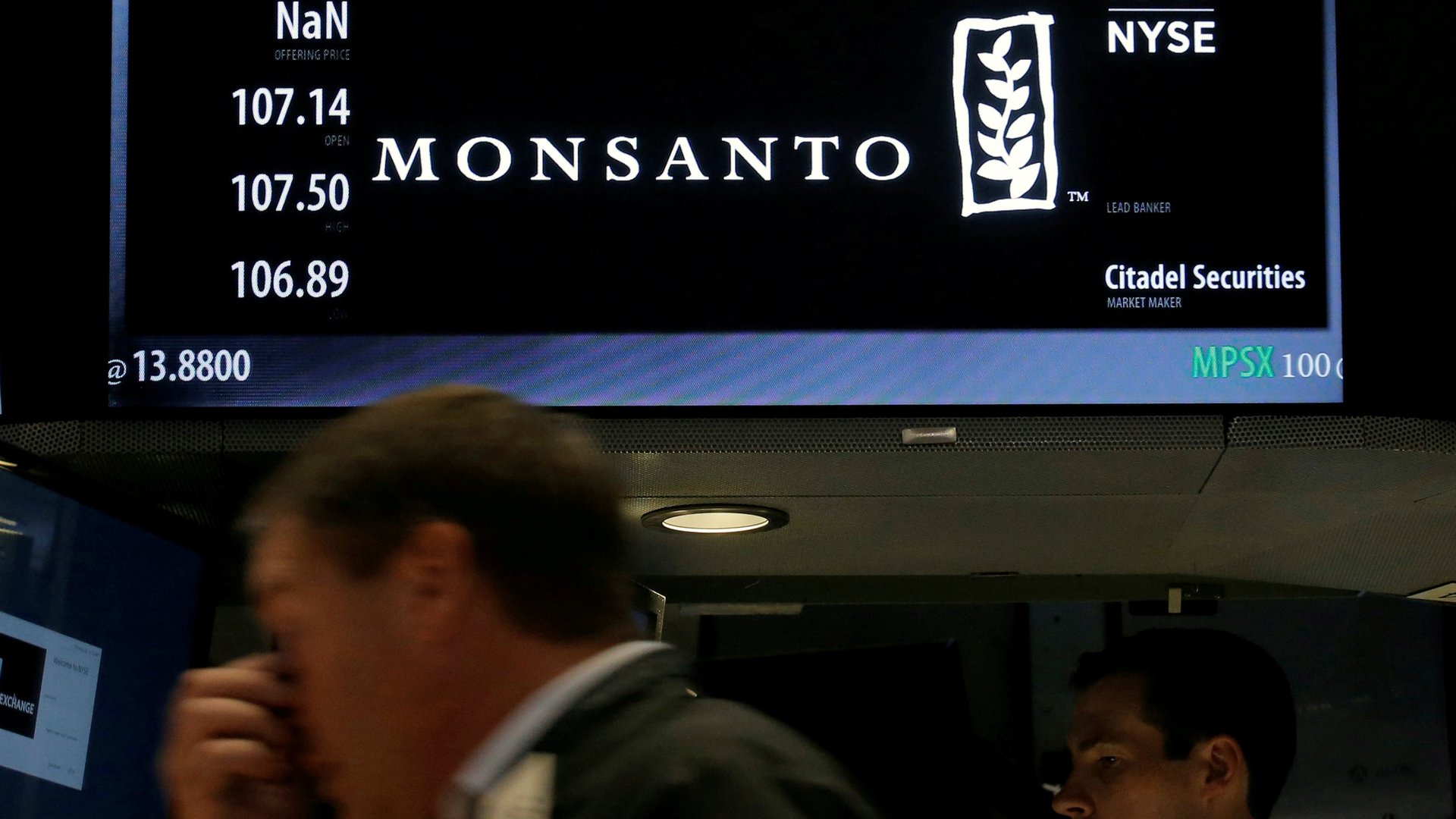Six companies are about to merge into the biggest farm-business oligopoly in history
Big farms are about to get a lot bigger.


Big farms are about to get a lot bigger.
With six agricultural giants on the verge of merging into three separate companies, consumers and farmers are feeling uneasy about the global implications and how it might impact the food system.
Top executives from Bayer, Monsanto, DuPont, Dow Chemical, and Syngenta today (Sept. 20) testified before the US Senate Judiciary Committee in Washington, making a case for why federal regulators should approve the mega-mergers, which stand to fundamentally reorganize global agriculture. (Executives from the sixth company involved in the consolidation, China National Chemical Corp., declined an invitation to appear at the hearing.)
The executives in attendance argued that the proposed mergers would combine their companies’ expertise and allow for greater efficiency in serving farmers and consumers. But whether that efficiency is worth the side effects of massive consolidation—possible price hikes and less competition in the marketplace—is an open question. In essence, should people put faith in three big companies to shepherd consumers and farmers into a world that can responsibly feed a growing global population?
Here’s what’s on the table
- On July 20, shareholders at Dow Chemical and DuPont agreed to a $59 billion merger that would bring under one umbrella two of the largest US chemical makers. The deal is awaiting US antitrust clearance.
- On Aug. 22, Chinese state-owned China National Chemical Corp. was cleared by US regulators to proceed with its $42 billion purchase of Swiss chemical and seeds company Syngenta. The deal, subject to US scrutiny because of Sygenta’s American business interests, marks the largest purchase of a foreign firm in Chinese history.
- On Sept. 14, Bayer, the German pharmaceutical and chemical giant, said it had reached an agreement to purchase US seed company Monsanto for $66 billion. If the deal is approved by US regulators, it would create the world’s largest seed and agriculture chemicals company.
The consolidation of these six highly competitive companies into three juggernauts has left many farmers and consumers uneasy. Consumers advocates say they worry the mergers will usher in a “new era of sterile crops soaked in dangerous pesticides.” Farmers worry that less competition in the marketplace will give the merged companies an ability to increase prices of seeds and chemicals—something that would be particularly harmful during a time when US farm incomes are dropping.
That’s part of the case that National Farmers Union president Roger Johnson made to senators, warning that approval of the mergers would lead not only to higher prices, but also less innovation and fewer products from which farmers can choose. Even the mighty American Farm Bureau lobby expressed some trepidation.
“Any one of these [merger and acquisition] activities could certainly be well understood; all of them occurring at the same time is the challenge,” said Bob Young, chief economist for the lobby. “Obviously you’d rather have six companies…but if the economics aren’t there to justify six companies, it just won’t happen.”
The corporate perspective
For their part, the company executives stressed that, in a world where internet companies such as Google can quickly pivot to manufacturing driverless cars and Amazon founder Jeff Bezos can invest in rockets, the nimbleness of agriculture will be paramount.
“Change can be rough for farmers,” testified Robb Fraley, Monsanto’s chief technology officer. “But in our industry, it is changing. Farmers are best served with companies investing more in new technology.”
Fraley noted that 15 years ago, Monsanto invested $300 million in research and development; this year it has invested $1.5 billion. By way of comparison, he said big-name technology firms such as Apple are spending upwards of $10 billion a year on R&D.
Left unsaid by the companies was that, with the exception of Bayer, the US and European giants have experienced shrinking sales. As Republican senator Thom Tillis of North Carolina put it, Dow’s numbers “look like the EKG of a heart attack patient.”
From that perspective, the mergers are as much about maintaining profit and staying financially healthy as they are about the development of new technologies. It’s not just a case of American farmers needing more technologically advanced tools; it’s also a white flag from big agribusiness companies struggling with the fact that, despite all their efficiencies and inventions, the US market is demanding supplies that let farmers grow more profitable and less complicated organic and all-natural foods.
Whether that trend continues remains to be seen. For now, the mergers are a clear sign that companies that invest in high-tech seeds and chemicals are going through a rough patch, and they think consolidation is their way out of it.